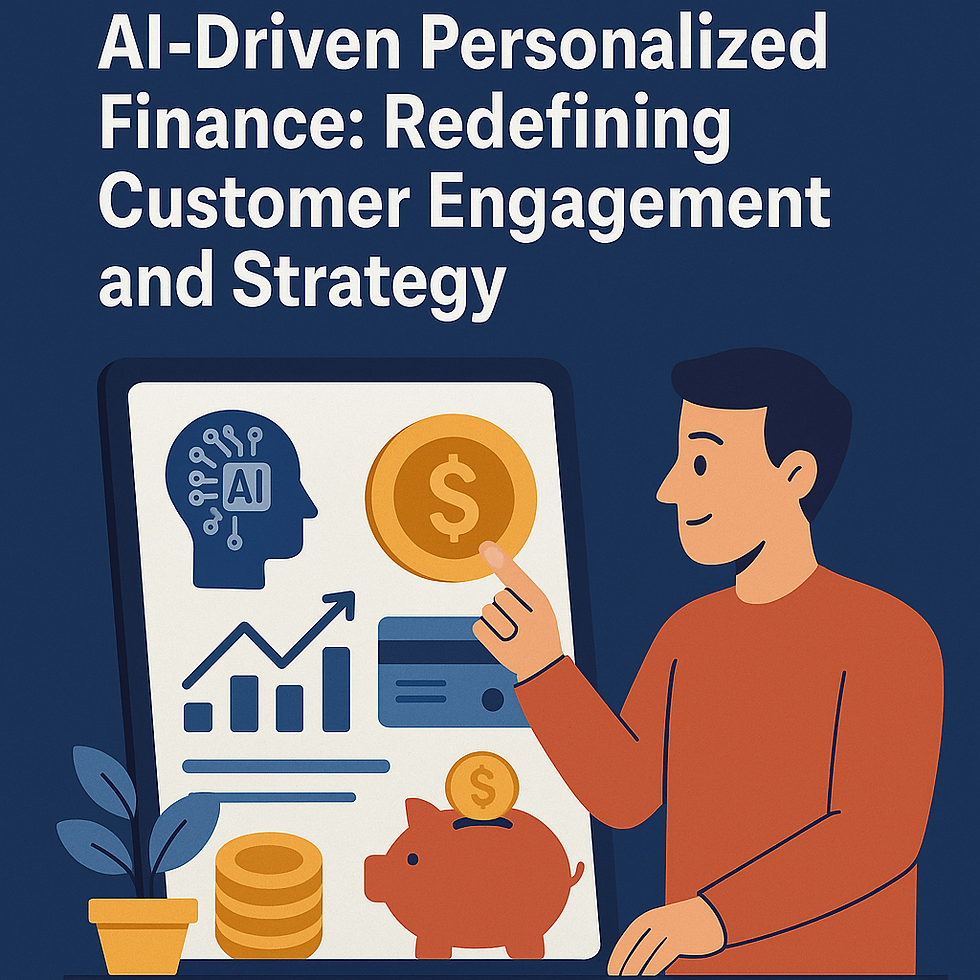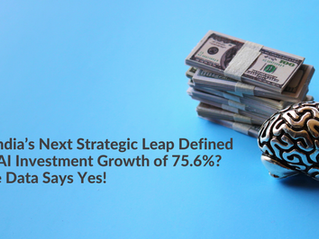AI-Driven Personalized Finance: Redefining Customer Engagement and Strategy
- AgileIntel Editorial

- Sep 10, 2025
- 4 min read

The finance industry is experiencing a significant shift as AI-driven personalisation replaces traditional products and advisory models. Clients now receive real-time, tailored financial information, including dynamic portfolio management, customised investment plans, and expense tracking. This transformation goes beyond technology, fundamentally changing how financial organisations deliver value and build client trust.
The Rising Tide of AI in Finance
AI adoption in financial services is accelerating. A KPMG survey of 2,900 firms in 23 countries found that 71% already use AI, with 41% at moderate to significant levels (KPMG). RGP projects that by 2025, over 85% of the industry will use AI for fraud detection, risk modelling, customer engagement, and IT operations management.
Practical applications are already emerging. For instance, the San Francisco Chronicle reports that integrating AI with robo-advisors enables personalised financial planning by delivering automated portfolio advice, instant alerts, and recommendations tailored to individual client lifestyles.
Business Case: Efficiency, Retention, and ROI
AI not only enables personalisation but also generates quantifiable returns. According to McKinsey, AI-driven personalisation can lower operational expenses by as much as 30% and enhance customer retention by over 35%. IBM anticipates that by 2027, the integration of AI in finance may boost forecast precision by 24%, speed up continuous closing processes by 23%, and reduce days sales outstanding by 29%.
Given these outcomes, organisations are unsurprisingly accelerating the adoption of personalisation across their core financial operations.
Real-World Applications: Personalisation at Scale:
The most visible impact of this shift can be seen in practical applications that bring personalisation to scale across banking, wealth management, and everyday financial decisions. Several use cases highlight how personalisation at scale is reshaping the finance sector:
a. Wealth Management & Advisory Platforms
Platforms like Mezzi and PortfolioPilot are transforming the landscape of digital advisory services. Mezzi is an "AI wealth copilot," integrating insights from large language models with market and brokerage data to provide customised portfolio strategies. On the other hand, PortfolioPilot combines machine learning algorithms with factor-based analytics to create personalised investment recommendations, tax insights, and estate planning assistance, while clearly advising users to consult with human advisors.
b. Financial Reporting & Forecasting
AI solutions like Martus's ReportBuilder Assistant help nonprofits and corporations automate financial reporting with real-time variance analysis and predictive modelling. These tools reduce errors, increase transparency, and enable leaders to act quickly on insights.
c. Human-Centred AI for Superior UX
Human-centred AI (HCAI) frameworks empower financial systems to understand user behaviours and deliver more relevant, context-sensitive services. Studies indicate that HCAI enhances usability and fosters trust, which is crucial for acceptance in sensitive areas such as finance. In credit risk assessment, models like Random Forest have shown nearly 89% accuracy in identifying borrower risk, enhancing personalisation while maintaining compliance.
d. Chatbots and Virtual Assistants
Conversational AI has become the most visible front-end of personalisation. Modern chatbots and virtual assistants now go beyond answering questions to deliver a wide range of tailored financial services:
Portfolio Monitoring & Rebalancing: Bots actively alert users when their allocations deviate from targets.
Expense Tracking & Budgeting: NLP-driven assistants classify spending and predict cash flow challenges.
Loan & Credit Guidance: Virtual advisors model repayment scenarios and refine loan choices.
Retirement Planning: Predictive models assess income shortfalls and suggest necessary adjustments.
The Consumer Financial Protection Bureau (CFPB) reported that chatbots could generate nearly US$8 billion in annual cost savings, about $0.70 per customer interaction, by standardising low-value engagements at scale. This efficiency is reinforced by growing adoption: more than 37% of the U.S. population interacted with a bank's chatbot in 2022, a figure expected to rise further by 2026.
Navigating Risks: Ethics, Regulation, and Human Trust
With AI personalisation, risks inevitably follow. Concerns over data bias, privacy, and explainability remain acute. A 2025 study by Cornell University highlights regulatory gaps in liability and algorithmic transparency, calling for adaptive governance frameworks for AI in financial services.
Equally important is human trust. A report by Kiplinger states that despite their digital fluency, 91% of Gen Z investors still value human advisors, citing transparency, accountability, and empathy as irreplaceable.
The Synthesis of AI and Human Expertise
The most promising future for personalised finance lies not in AI taking over human roles, but in AI enhancing human capabilities. Platforms such as Mezzi and PortfolioPilot actively promote collaboration with fiduciaries for intricate decisions, highlighting that while AI provides accurate insights, human experts bring judgment, ethics, and trust.
This combined approach, where AI manages scale and analysis while humans steer strategy and relationships, is rapidly becoming the standard in the industry.
Future Considerations: Key Focus Areas for Finance Leaders
Strategic Implementation: Focus on high-impact use cases like forecasting, reporting, and tailored advisory.
Governance & Ethics: Maintain transparency, auditability, and fairness in all AI applications.
Human-AI Collaboration: Prepare professionals to interpret and question AI results.
Continuous Evaluation: Keep track of regulations, changing customer demands, and model effectiveness.
Looking Ahead: What Finance Leaders Should Prioritise
Strategic Implementation: Focus on high-leverage areas like forecasting, reporting, and personalised recommendations. Develop pilot programs that demonstrate clear ROI.
Ethics & Governance: Maintain transparency and auditability, ensure AI models are explainable, data privacy is safeguarded, and fairness is consistently tested.
Human-AI Collaboration: Train finance professionals to interpret, challenge, and enhance AI outputs, reinforcing the hybrid model.
Continuous Evaluation: Monitor regulations, evolving customer needs, and model performance.
Conclusion
AI-powered personalised finance is revolutionising the industry with accuracy, efficiency, and insights tailored to individual users. From chatbots providing customised financial guidance to predictive models influencing long-term planning, organisations are witnessing improved cost savings, forecasting precision, and customer retention. However, despite the progress of AI, human aspects such as trust, empathy, and ethical supervision remain essential. The future of finance is a robust combination: AI serves as the engine, while humans act as the guiding compass.







Comments